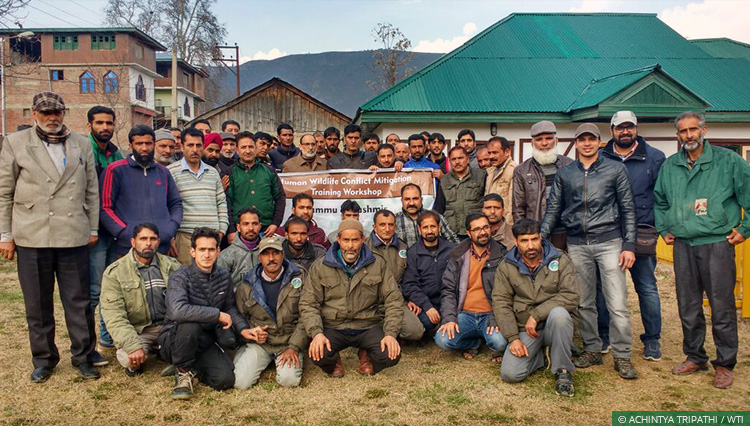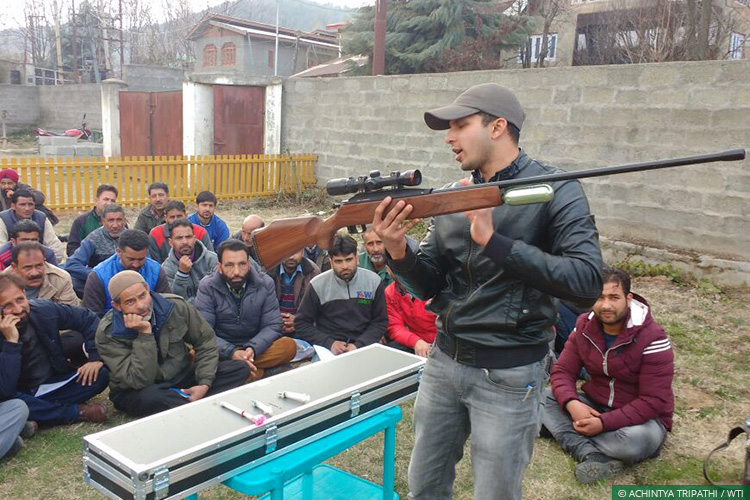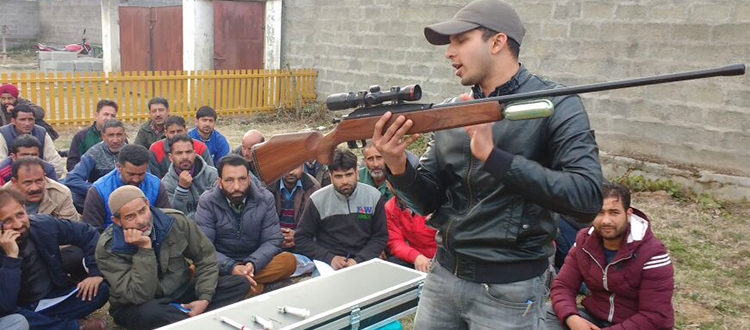J&K Department of Wildlife Protection and WTI Conduct Training Workshops on Human-Wildlife Conflict Mitigation for Frontline Forest Staff
 Trainees and trainers at the Human-Wildlife Conflict Mitigation workshop at Baramulla
Trainees and trainers at the Human-Wildlife Conflict Mitigation workshop at Baramulla
Jammu & Kashmir, March 17, 2017: Working in partnership with the Jammu & Kashmir Department of Wildlife Protection, Wildlife Trust of India (WTI) today completed the last of a series of Human-Wildlife Conflict Mitigation Training Workshops that have been conducted since 2015 for frontline forest staff in the state.
Over 100 personnel from the Department of Wildlife Protection, Forest Department and Forest Protection Force from South and North Kashmir were trained in the two workshops held in Bijbehara, Anantnag (14-15th March) and Baramulla (16-17th March), bringing the total number of staff trained over the series of five workshops to around 250. Apart from the latest tranquilisation protocols and wildlife management techniques, the staffs were taught how to develop participatory models that involve local communities and media personnel, thereby ameliorating the negative effects of conflict between people and wild animals.
“The next step would be to hand-pick select trainees and expose them to advanced trainings to constitute efficient Conflict Mitigation Squads in areas facing the highest levels of conflict”, said Dr Jagdish Kishwan, WTI’s Chief Advisor.
“Our frontline staff learned about precautions to be taken while tranquilising animals in a conflict situation, as well as important aspects of crowd management.”
Conflict between people and wild animals is on the rise in Jammu & Kashmir, with 100 people having been killed and over 1000 injured in leopard and black bear attacks in the Kashmir valley alone over the past year. Mr Suresh Chugh (IFS), the state’s Chief Wildlife Warden, said that the Wildlife Department has taken proactive steps to address the issue by setting up 25 control rooms each in the Kashmir and Jammu regions of the state. The training workshops organised in partnership with WTI have been planned so as to develop the capacity of staff being deputed in these control rooms.
“This workshop was very crucial for our department”, said Mr Mohammed Sadiq, Wildlife Warden for North Kashmir, who handles areas such as Kupwara and Bandipore that are currently experiencing extremely high conflict with leopards and bears. “Our frontline staff learned about precautions to be taken while tranquilising any animal in a conflict situation, as well as important aspects of crowd management.”
 A veterinarian brought in as an external resource person trains frontline forest personnel in wild animal tranquilisation techniques
A veterinarian brought in as an external resource person trains frontline forest personnel in wild animal tranquilisation techniques
“Along with human injuries and fatalities, human-wildlife conflict also results in a large number of wild animal deaths as local populations retaliate to such incidents. Several bears and leopards have been killed by lynch mobs as well as poisoned carcasses in the past few years”, said WTI Regional Head Dr Riyaz Ahmad.
“Wild animals rarely attack humans unprovoked unless they are unfit or maimed. Leaving them alone or allowing them to return to the forest by providing safe passage is often the best solution. Local communities and mediapersons need to be made aware of such facts in order to bring about a long-term behavioural change. Teaching forest staff the appropriate tactics related to crowd and media management is crucial to reducing negative interactions between wildlife and people”, said Dr Mayukh Chatterjee, Head, Conflict Mitigation Division, WTI.









